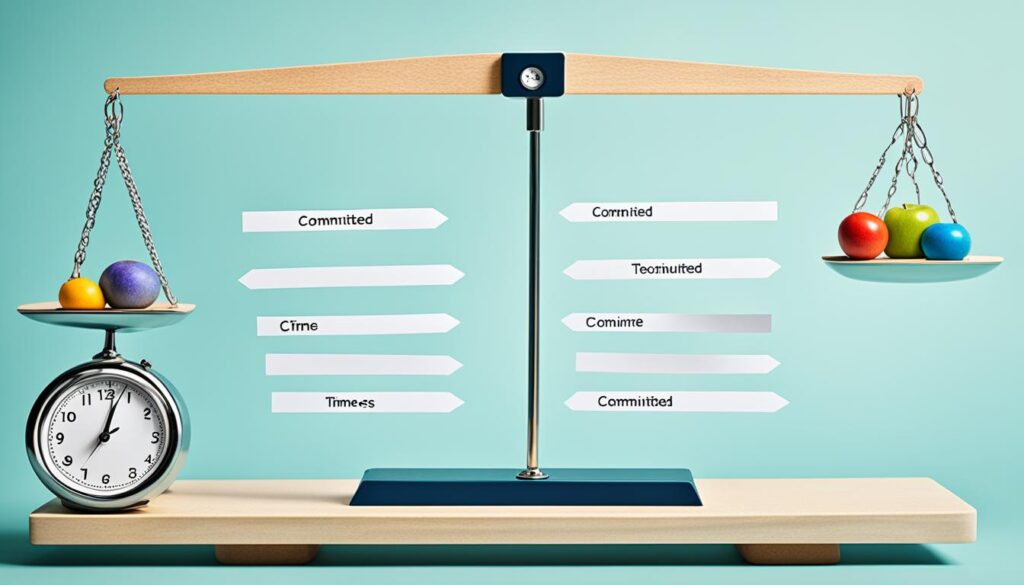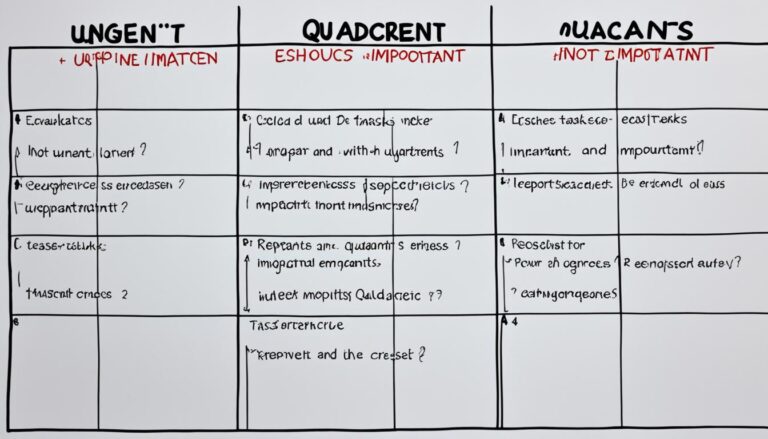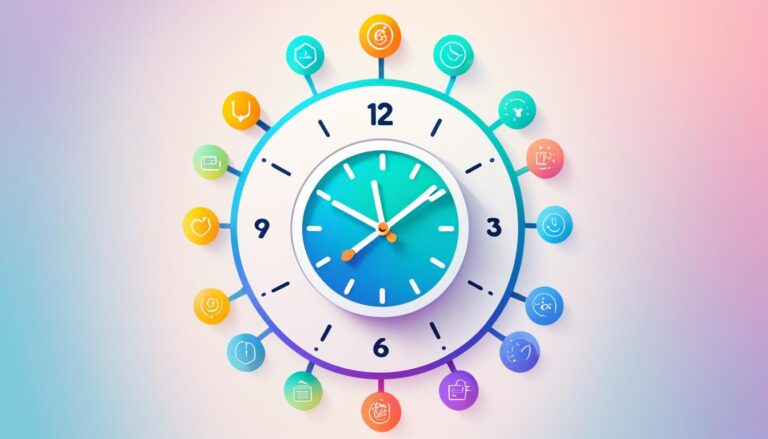Free Time: Your Priority Over Committed Tasks

“You will never find time for anything. If you want time, you must make it.” – Charles Buxton
In today’s fast-paced world, it’s easy to get caught up in a never-ending cycle of commitments and tasks. However, it’s important to prioritize your free time and make it a priority in your life. By managing your priorities effectively and practicing good time management, you can ensure that you have enough time for leisure activities and achieve a better work-life balance.
Key Takeaways:
- Free time takes priority over committed time. It is essential to prioritize your leisure activities and make time for them.
- Effective time management can lead to increased productivity, reduced stress, and overall happiness in your life.
- Prioritizing free time allows for a better work-life balance, preventing burnout and improving job satisfaction.
- By managing your time effectively and practicing good prioritization, you can achieve a healthy balance between work and play.
- Remember that time is a precious resource, and by managing it effectively, you can transform your life and enjoy the benefits of free time.
The Benefits of Prioritizing Free Time
Prioritizing free time is essential for maintaining a healthy work-life balance and nurturing your overall well-being. By making time for leisure activities and hobbies, you can recharge and rejuvenate, leading to improved mental health and increased happiness.
Studies have shown that taking regular breaks and engaging in activities you enjoy can significantly reduce stress levels and increase productivity. When you prioritize free time, you give yourself the opportunity to unwind, relax, and pursue activities that bring you joy and fulfillment.
One of the key benefits of prioritizing free time is the prevention of burnout. When you constantly prioritize work and neglect self-care, you risk becoming overwhelmed and exhausted. By allocating time for yourself, you can avoid reaching a breaking point and maintain a healthy work-life balance.
“The Organized Executive” by Stephanie Winston emphasizes the importance of effective time management in increasing productivity and profitability in the workplace. By allocating time for both work and leisure, you create a harmonious balance that enables you to be more focused, creative, and efficient in your professional endeavors.
Prioritizing free time also allows you to pursue personal interests and hobbies that can contribute to your personal and professional growth. Whether it’s learning a new skill, engaging in fitness activities, or exploring creative outlets, these experiences can broaden your horizons and enhance your overall quality of life.
| The Benefits of Prioritizing Free Time | |
|---|---|
| Improved mental health and well-being | Increased happiness and reduced stress levels |
| Prevention of burnout | Enhanced work-life balance and job satisfaction |
| Increased productivity and profitability | Opportunity for personal and professional growth |
Remember, your time is precious, and by prioritizing free time, you are investing in your own happiness and fulfillment. Make it a habit to allocate time for yourself and embrace the benefits it brings.

Time Management Strategies for Balancing Commitments
Managing multiple commitments requires effective time management strategies. To ensure you stay on top of your tasks and responsibilities, consider the following techniques:
Prioritize tasks based on importance and urgency
Creating a to-do list and categorizing tasks based on their importance and urgency can help you prioritize effectively. Use time management tools like the Eisenhower box to determine which tasks are critical and need immediate attention.
Delegate tasks whenever possible
Don’t be afraid to delegate tasks to others if they can handle them effectively. This frees up more time for you to focus on important responsibilities and reduces your workload.
Utilize time blocking
Time blocking involves allocating specific time slots for different activities or tasks. By scheduling your day in advance and dedicating specific time blocks to certain tasks, you can manage multiple tasks more efficiently and avoid feeling overwhelmed.
Eliminate distractions and focus on one task at a time
Avoid multitasking and instead focus on one task at a time. Eliminate distractions, such as turning off notifications on your phone or closing unnecessary tabs on your computer, to maintain focus and improve productivity.
By implementing these time management techniques, prioritization tactics, and effective use of time management tools, you can successfully balance your commitments and make the most of your available time.

Overcoming Overcommitment with Time Management
Overcommitment can lead to stress and ineffective work. It’s crucial to develop effective time management skills and strategies to successfully manage multiple projects and tasks. By implementing proper prioritization techniques and utilizing time tracking software, you can effectively handle your workload and avoid the negative consequences of overcommitment.
One important aspect of managing overcommitment is understanding and acknowledging your limits. Recognize when you have taken on too much and be willing to ask for assistance when needed. Delegating tasks to trusted colleagues or team members can help alleviate the pressure and ensure that projects are completed efficiently.
An interview question mentioned in the source underlines the importance of effective time management skills, such as strategic thinking, organizing, and problem-solving abilities. By honing these skills and incorporating them into your daily routine, you can navigate through multiple projects and tasks with ease.
Time Management Strategies for Overcoming Overcommitment
When facing overcommitment, it’s essential to utilize time management strategies that allow for efficient task management and prioritization. Here are some effective techniques:
- Task prioritization: Create a prioritized to-do list to identify and focus on the most critical tasks. Use the Eisenhower box to determine the importance and urgency of each task.
- Time tracking software: Utilize time tracking tools to monitor how you allocate your time between various projects. This will help ensure that you are allocating the appropriate amount of time to each task.
- Effective delegation: Identify tasks that can be delegated to others and allocate them accordingly. Delegating tasks will lighten your workload and allow you to focus on high-priority responsibilities.
- Time blocking: Allocate specific time slots for different activities or tasks to ensure that each receives dedicated attention. This technique helps prevent multitasking and promotes focus and efficiency.
By implementing these time management strategies and skills, you can overcome overcommitment and achieve better results in your work. With effective task prioritization and strategic time allocation, you can navigate through multiple projects and tasks while maintaining productivity and minimizing stress.
Example of an Effective Time Management Strategy:
| Project | Tasks | Deadline |
|---|---|---|
| Project A | Research Planning Execution |
15th February 20XX |
| Project B | Analysis Reporting |
25th February 20XX |
| Project C | Design Testing Implementation |
10th March 20XX |
By organizing your tasks and deadlines in a table like the one above, you can gain a clearer picture of your commitments and effectively prioritize your time. This visual representation helps you allocate your time efficiently and maintain a structured approach to meet your project requirements.
Remember, effective time management skills are essential for handling multiple projects and preventing overcommitment. By prioritizing tasks, utilizing time management techniques, and recognizing your limits, you can successfully navigate through your workload and achieve optimal results.

Conclusion
In today’s busy world, managing time effectively is crucial for achieving a healthy work-life balance. By making free time a priority, you can ensure that you have enough time to recharge and enjoy life outside of work. With the right time management strategies and prioritization techniques, you can strike the perfect balance between your professional and personal life.
By prioritizing your free time, you are acknowledging the importance of self-care and leisure activities. Taking breaks and pursuing hobbies not only rejuvenate your mind and body but also enhance your productivity and overall satisfaction with life. Remember, it’s not just about working hard; it’s also about enjoying the rewards of your hard work.
Effective time management allows you to make the most of every moment and maximize your potential. By utilizing techniques like creating to-do lists, time blocking, and eliminating distractions, you can optimize your productivity and achieve your goals efficiently. Remember that time is your most valuable asset, and managing it well can bring you closer to achieving the life you desire.
So, take control of your time. Set boundaries, prioritize your tasks, and allocate dedicated time for leisure and personal interests. By managing your time effectively, you can achieve a harmonious work-life balance, nurture your well-being, and enjoy the importance of free time. Embrace the power of time management and transform your life for the better.






